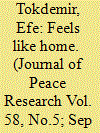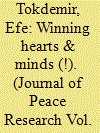| Srl | Item |
| 1 |
ID:
155047


|
|
|
|
|
| Publication |
Cambridge, Harvard University Press, 2017.
|
| Description |
xvii, 394p.hbk
|
| Standard Number |
9780674972261
|
|
|
|
|
|
|
|
|
|
|
|
Copies: C:1/I:0,R:0,Q:0
Circulation
| Accession# | Call# | Current Location | Status | Policy | Location |
| 059198 | 303.48/SUB 059198 | Main | On Shelf | General | |
|
|
|
|
| 2 |
ID:
182670


|
|
|
|
|
| Summary/Abstract |
How do people react to foreign actors’ involvement in a conflict in a third party? Many studies have explored how individuals react to their country’s foreign policy choices, as well as how they react to the policies targeting their countries. Yet, we know less about how they form their attitudes regarding the policies not directly aiming at their own countries, and hence, their well-being. Building on intergroup relations and employing a social psychological approach, this article argues that identity serves as a heuristic through which individuals evaluate foreign actors, and their policies targeting in- and out-group members living abroad. Conducting a survey experiment in Turkey, I test my claims in the context of the Syrian Civil War. The findings of the experiments reveal that transnational identity ties have an impact on attitude formation: Turks and Kurds express positive/negative attitudes towards the USA and Russia conditional on whether their involvement to the conflict favor/disfavor their in-group/out-group across the border. Broadly speaking, the results show that domestic cleavages are of importance in predicting the public’s reaction to the developments in international politics, which implies a necessity of taking domestic politics in designing soft power promotion and public diplomacy strategies for many global and regional powers in attempting to win hearts and minds abroad.
|
|
|
|
|
|
|
|
|
|
|
|
|
|
|
|
| 3 |
ID:
156661


|
|
|
|
|
| Summary/Abstract |
Foreign aid is a policy tool implemented with the purpose of fostering both hard and soft power abroad. Yet, previous research has not probed the effects of US foreign aid on public attitudes toward the US in the recipient countries. In this article, I argue that US foreign aid may actually feed anti-Americanism: aid indirectly creates winners and losers in the recipient countries, such that politically discontented people may blame the US for the survival of the prevailing regime. Drawing on Pew Research for Global Attitudes and on USAID Greenbook datasets, I focus on determining both the conditions under which foreign aid exacerbates anti-Americanism and the type of aid most likely to do this. The findings reveal that political losers of the recipient countries are more likely to express negative attitudes toward the USA as the amount of US aid increases, whereas political winners enjoy the results of US aid and view the USA positively accordingly. Moreover, the effect of US aid on attitudes toward the USA is also conditional on the regime type. While US aid increases the likelihood of anti-American attitudes among the losers in non-democratic countries, it decreases the likelihood of anti-Americanism among the losers in democratic ones. This article has important implications for policy in terms of determining how and to whom to provide aid in the context of the possible ramifications of providing aid at the individual level.
|
|
|
|
|
|
|
|
|
|
|
|
|
|
|
|